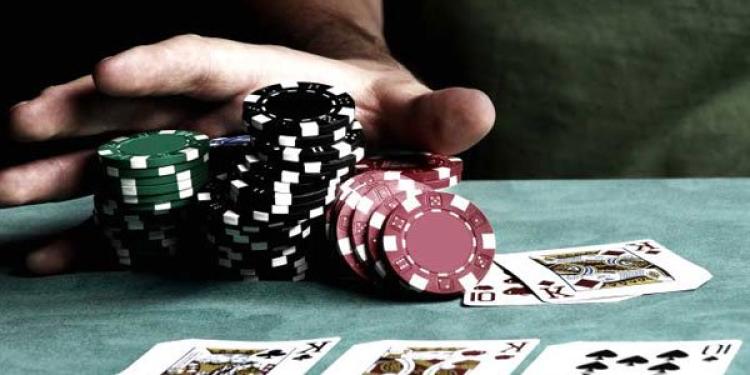Problem Gambling and its Severe Consequences
Posted: February 12, 2014
Updated: October 4, 2017

Problem gambling is a growing problem of the society nowadays, which needs to be taken into serious consideration and treated with care.
People can easily develop different kinds of addictions like alcohol, drugs, gambling, etc., which can have devastating effect on their lives, families, friends, work.
Gambling addiction may often be mistaken with passion for the game and care about winning in general, so the first step towards overcoming this serious problem, suggested by specialists is to recognize its existence and to start working hard to overcome it.
Compulsive gambling is usually caused by stress, anxiety and difficulties, which the gambler is trying to forget about, using betting as an excuse. Therefore, after admitting the existence of gambling problem, the person in question should implement healthier ways of dealing with their personal difficulties.
Treating a gambling problem is very individual and it may include therapy, exercising, relaxation or picking up different hobbies. And of course one very important aspect of dealing with this serious issue is maintaining the recovery, which will eventually lead to happier and healthier life.
Gambling news are full of examples of people with serious betting problems and the following two stories are some of the most recent examples of real life troubles.
Around four years ago Woolliscroft, who lives in Offerton handed his picture for the first time to a bookie on Little Underbank, asking for betting ban. This didn’t turn out so well and he continued gambling and gave out his picture again in Stockport town last July, asking all bookies to never let him bet again.
Unfortunately for him, this didn’t help either as he described: “I then went back again and lost GBP 240 in the space of five minutes when I shouldn’t have been allowed in. I know it’s my own fault, but I was counting on them to keep up my ban – they had my picture at the counter.”
Alex added: “I’m trying to run a business and I’ve got a family but at the end of the day I’m the first one to admit I’m an addict. All I’m asking is that they don’t let me in.”
Alex returned to gambling after six months without placing a bet and a huge loss in July last year made him take the extreme decision to voluntarily ban himself from all Stockport bookmakers.
Woolliscroft added: “I’ve been to meetings and tried to get help. It’s even given me a stutter – it’s ruined my life. The roulette machines are evil. I honestly believe they are more addictive than drugs.”
William Hill’s spokesman commented: “Self-exclusion is exactly what it says. We try to police it as best we can, but if someone does manage to place a bet, the bet will stand – win or lose.”
He added on the case of Alex: “We reached out on several occasions to Mr Wooliscroft to attempt to tailor a solution – above and beyond our usual processes – to assist him with his attempts at recovery. We would urge him to take up these opportunities and meet with our senior management so we can complete the process.’’
He was a part-time accountant at the restaurant and recently pleaded guilty at Dublin Circuit Criminal Court for faking signatures on cheques and stealing money from his former employer Peter Fortune, between 2005 and 2008.
Carlos seems to have been a very decent man before involving himself in gambling and turning into “hopeless and deeply addicted gambler”, leaving behind his family and reputation.
Fortune hired him to deal with some accounting for the restaurant in Stillorgan, trusting their 30 years of acquaintance. Unfortunately for the employer, Carlos didn’t turn out to be what he expected and things got out of control after Carlos became a cheque signatory.
Carlos admitted his deed in 2011 and said that in total he lost around EUR 150,000 on gambling, which turned into substantial debt and he could not pay back the stolen money. Unfortunately, it doesn’t seem like he had taken any real measures against his addiction problem.
There are many ways to address this issue, but the most important of all is problem gamblers to recognize their addiction, admit its existence and find ways to address it with or without outside help. That seems to be the only way in which the current alarming situation can be improved.
People can easily develop different kinds of addictions like alcohol, drugs, gambling, etc., which can have devastating effect on their lives, families, friends, work.
Gambling addiction may often be mistaken with passion for the game and care about winning in general, so the first step towards overcoming this serious problem, suggested by specialists is to recognize its existence and to start working hard to overcome it.
Compulsive gambling is usually caused by stress, anxiety and difficulties, which the gambler is trying to forget about, using betting as an excuse. Therefore, after admitting the existence of gambling problem, the person in question should implement healthier ways of dealing with their personal difficulties.
Treating a gambling problem is very individual and it may include therapy, exercising, relaxation or picking up different hobbies. And of course one very important aspect of dealing with this serious issue is maintaining the recovery, which will eventually lead to happier and healthier life.
Gambling news are full of examples of people with serious betting problems and the following two stories are some of the most recent examples of real life troubles.
Gambling addict requests a lifetime ban from bookies
Alex Woolliscroft from England has a very long and complicated gambling story. He confesses that he had lost more than GBP 25,000 while betting. Now that he has a baby with his girlfriend Alexandra, he is ready to do whatever it takes to recover from his addiction.Around four years ago Woolliscroft, who lives in Offerton handed his picture for the first time to a bookie on Little Underbank, asking for betting ban. This didn’t turn out so well and he continued gambling and gave out his picture again in Stockport town last July, asking all bookies to never let him bet again.
Unfortunately for him, this didn’t help either as he described: “I then went back again and lost GBP 240 in the space of five minutes when I shouldn’t have been allowed in. I know it’s my own fault, but I was counting on them to keep up my ban – they had my picture at the counter.”
Alex added: “I’m trying to run a business and I’ve got a family but at the end of the day I’m the first one to admit I’m an addict. All I’m asking is that they don’t let me in.”
Woolliscroft struggled through different recovery strategies
Problem gambling is one of the worrying subjects nowadaysIn September 2012, he lost again. This time it was GBP 700 in five minutes at a Stockport casino. Right after, he took the drastic measure to tattoo the date 26.9.12 on his hand in order to remind himself of his loss every time he looks at his hand, and try to fight the addiction.
• Gambling addiction has to be recognized and accepted by bettors themselves
• Alex Woolliscroft requested lifetime betting ban from bookies in the UK
• John Carlos deceived his employer with EUR 135,000 in order to be able to play online poker and is currently waiting for his trial
Alex returned to gambling after six months without placing a bet and a huge loss in July last year made him take the extreme decision to voluntarily ban himself from all Stockport bookmakers.
Woolliscroft added: “I’ve been to meetings and tried to get help. It’s even given me a stutter – it’s ruined my life. The roulette machines are evil. I honestly believe they are more addictive than drugs.”
Some betting operators recognize the problem
William Hill, famous land-based and online casino in the UK, commented that they support all people with gambling addictions and have a “self-exclusion” policy. They also met Alex and requested a new photograph from him.William Hill’s spokesman commented: “Self-exclusion is exactly what it says. We try to police it as best we can, but if someone does manage to place a bet, the bet will stand – win or lose.”
He added on the case of Alex: “We reached out on several occasions to Mr Wooliscroft to attempt to tailor a solution – above and beyond our usual processes – to assist him with his attempts at recovery. We would urge him to take up these opportunities and meet with our senior management so we can complete the process.’’
Gambling problem brings fraud trial to bettor
The second case is of John Carlos, former teacher, who is described to have led a “remarkably ordinary life” developed an addiction to play online poker in Ireland, is going on trial for deceiving with EUR 135,000 an Eddie Rockets restaurant.He was a part-time accountant at the restaurant and recently pleaded guilty at Dublin Circuit Criminal Court for faking signatures on cheques and stealing money from his former employer Peter Fortune, between 2005 and 2008.
Carlos seems to have been a very decent man before involving himself in gambling and turning into “hopeless and deeply addicted gambler”, leaving behind his family and reputation.
Fortune hired him to deal with some accounting for the restaurant in Stillorgan, trusting their 30 years of acquaintance. Unfortunately for the employer, Carlos didn’t turn out to be what he expected and things got out of control after Carlos became a cheque signatory.
The truth about the problem gambler finally came true
Everything came out in 2008 when an external tax audit took place in the restaurant and significant amount of suspicious cheques was found. Later, Carlos' bank account showed a lot of amounts going to the Paddy Power poker website, which operates according to the Irish gambling laws.Carlos admitted his deed in 2011 and said that in total he lost around EUR 150,000 on gambling, which turned into substantial debt and he could not pay back the stolen money. Unfortunately, it doesn’t seem like he had taken any real measures against his addiction problem.
Compulsive gambling is a serious problem
Significant number of people are struggling with gambling issues and their amount seems to be growing in the last years.There are many ways to address this issue, but the most important of all is problem gamblers to recognize their addiction, admit its existence and find ways to address it with or without outside help. That seems to be the only way in which the current alarming situation can be improved.
Related content
Subscribe
0 Comments












